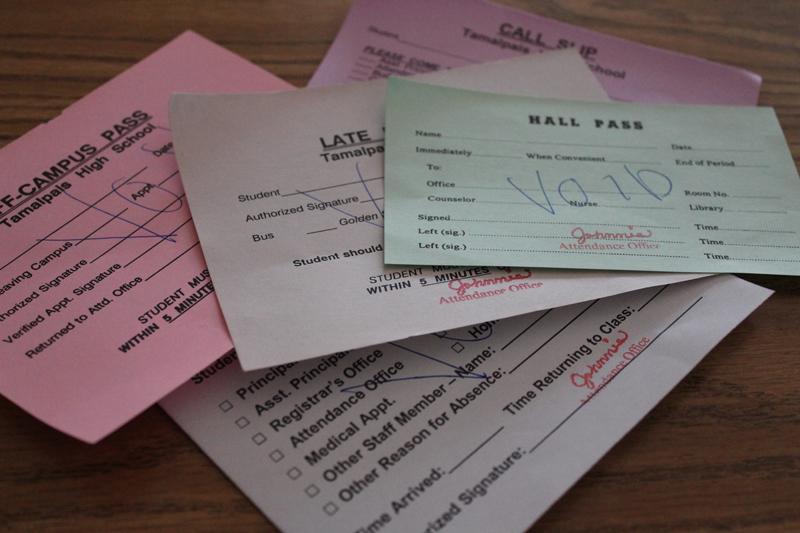The Tamalpais Union Board of Trustees is drafting a new policy on consequences for unexcused absences.
The new policy, which continues to be revised with input from the community and is not yet in effect, aims to remedy what Superintendent Laurie Kimbrel calls “double and triple jeopardy.” The board’s philosophy calls for replacing these academic consequences with behavioral ones.
Currently, after four unexcused absences in the same class, a teacher may lower a student’s grade by one letter. If five or more unexcused absences occur in one class, the teacher may deduct one credit for that semester. This loss of credit must be made up by retaking the class or enrolling in the Summer School One Credit Redemption Program. However, the latter is no longer an option as summer school has been cancelled for 2013.
“If a student misses class then they shouldn’t have a ‘double whammy effect’ of having a grade that’s probably going to be lowered from missing class anyway and having an extra grade reduction,” said Aaron Pribble, social studies teacher and President of the Tamalpais Federation of Teachers.
“Having the teacher lower a grade or take away a credit is too severe, because it almost punishes the students twice,” said junior Tanner Powell. “They miss the material in class which makes their grade drop naturally, and then they have an additional grade drop or loss of credit by the teacher. So, I think a behavioral consequence would be more appropriate.”
Concerns have arisen that these new behavioral consequences will not be substantial enough to combat truancy.
“I’m hard pressed to understand how these kids are gonna care one way or another when the only thing that really goes to colleges and the only thing they really care about is the academic grade,” said Drake social studies teacher Steve Bluestone at a Board meeting held on January 23 to discuss the matter.
“I want to make sure class time is valued. “I think what happens in the moment‑discussing important issues with a diversity of opinions-is a very valuable part of the learning process and I hope that sticks around,” said Pribble. He is concerned that if a strong consequence for skipping class is not implemented, class time will become devalued.
Another complaint Pribble has heard from teachers is that, using the board’s logic of decoupling behavior and academic issues, cheating would not necessarily have an academic consequence. “Teachers feel that that creates an incentive to cheat or at least no disincentive not to cheat,” said Pribble.
Along with cheating, participation grades are somewhat ambiguous. “If a student’s participation grade was dependent on…whether the student was in or out of class, then the student’s overall participation grade will not reflect the student’s in-class academic behavior correctly,” said junior Jessica Whiteley, Tam’s student representative to the Board of Trustees.
At the January 23 board meeting many teachers voiced the opinion that it is the responsibility of teachers to educate students on the importance of practices such as attendance and promptness. They “are real life skills that have applications in a real context,” said Redwood chemistry teacher Wendy Dority.
“The new attendance policy makes it a lot easier on the students and a lot harder on the teachers,” freshman Jessie Scarsella said. “If someone doesn’t want to go to class then they can just cut class and then the teacher has to spend time making up the work they missed with them. I think the new policy is a bad idea.”
The school board has recently been revising many of their policies, some of which are over a decade old. Many revisions are to align with California Education Code, however, this policy change is based on the Board’s philosophy.
New policies will continue to be revised and discussed at School Board meetings at the District Offices at Redwood High School.


